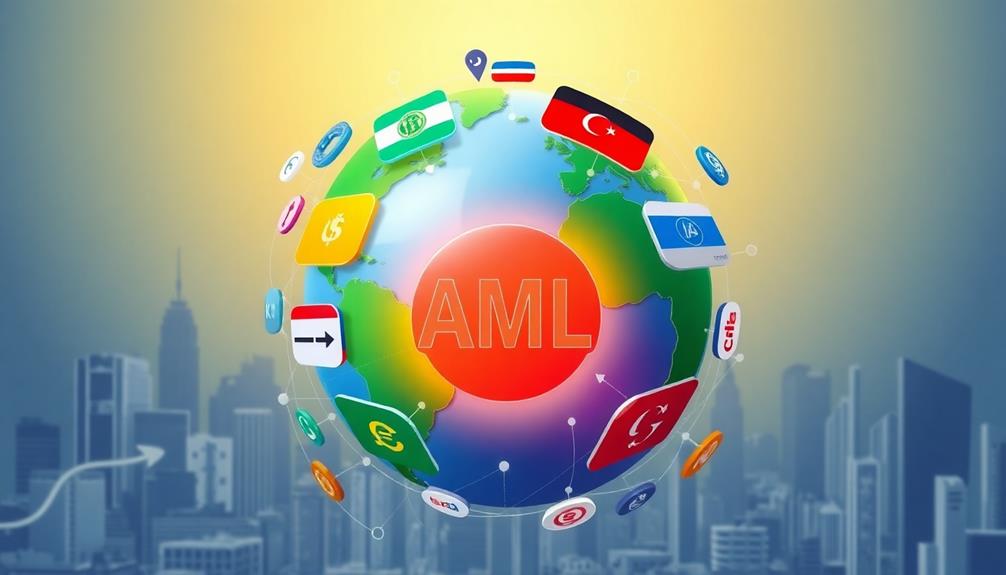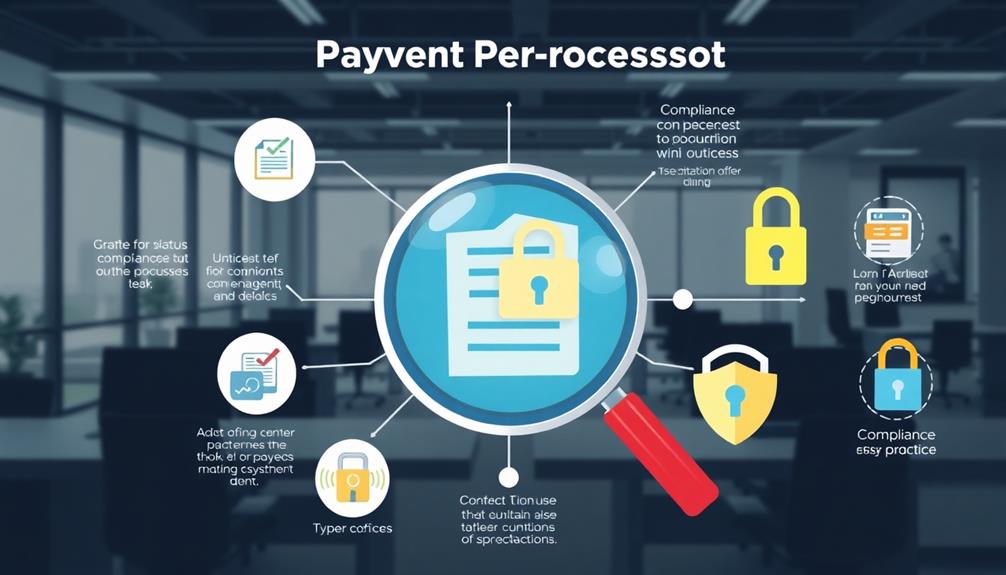AML compliance is crucial in payment processing to shield your business from hefty legal penalties and build customer trust. As a payment processor, you must understand that regulations vary by region, so thorough Know Your Customer (KYC) practices are essential. Appointing an AML compliance officer and continuously monitoring transactions helps spot suspicious activity. Invest in automated identity verification to streamline your processes and guarantee your staff is updated on the latest AML frameworks. By prioritizing compliance, you not only protect your brand but also create a safer financial environment. There's so much more to discover about AML compliance strategies.
Key Takeaways
- Payment processors must adhere to varying AML regulations across jurisdictions, including stringent requirements in the EU and Canada.
- Conducting thorough Know Your Customer (KYC) verifications is essential to identify and prevent fraudulent activities.
- Appointing a dedicated AML compliance officer ensures effective monitoring and reporting of suspicious transactions.
- Continuous transaction monitoring is crucial for detecting unusual patterns and mitigating financial crime risks.
- Regular staff training on evolving AML regulations is necessary to maintain compliance and adapt to changing legal landscapes.
Importance of AML Compliance

When it comes to payment processing, understanding the importance of AML compliance isn't just a legal obligation; it's a vital strategy for your business's longevity. Adhering to AML compliance helps you meet legal requirements in various jurisdictions like the USA, UK, Canada, and EU, protecting your business from hefty penalties and potential shutdowns.
In 2022 alone, global penalties for non-compliance reached an astounding USD 5 billion. By embracing Abraham's Business Success Principles, you can cultivate a mindset that attracts abundance and guarantees compliance is a priority.
Effective AML compliance safeguards your brand image by preventing the facilitation of financial crimes, such as money laundering, which can lead to severe consequences like lawsuits and reputational damage. When customers know you prioritize compliance, you build their trust, enhancing their overall experience with your services.
For payment processors looking to expand into regulatory markets, having a robust AML compliance strategy is essential. This means tailoring your compliance requirements to different jurisdictions, making sure you can navigate complex regulatory landscapes without jeopardizing your business operations.
Ultimately, by embracing AML compliance, you not only shield your company from potential risks but also position yourself as a trustworthy player in the payment processing industry.
Overview of Payment Processors

In the domain of digital transactions, payment processors serve as essential intermediaries, seamlessly facilitating electronic fund transfers between merchants and customers. They handle transaction processing by collecting payment data from customers, verifying it with banks, and guaranteeing that funds are transferred to merchants' accounts efficiently.
A key aspect of their operation is maintaining a healthy credit score to foster trust with financial institutions. Notable examples of third-party payment processors, like PayPal, Stripe, and Square, offer various services that streamline online transactions. These processors simplify complex payment processes by implementing robust security measures to protect sensitive payment data.
Additionally, they must adhere to compliance regulations, which can differ considerably across jurisdictions. Understanding local regulations is vital for payment processors to maintain operational integrity within the financial ecosystem. By staying informed about these laws, they can assure compliance and reduce the risk of fraud or other financial crimes.
Ultimately, payment processors play a pivotal role in the smooth functioning of electronic fund transfers, providing not only convenience but also a framework for secure and compliant transaction processing. This guarantees trust among merchants and customers alike, fostering a healthier financial environment.
Global AML Requirements

How do global Anti-Money Laundering (AML) requirements impact payment processors? These regulations vary greatly across regions, influencing how you manage compliance.
For instance, efficient general ledger coding can enhance financial reporting accuracy, which is critical in demonstrating compliance with AML regulations. In the U.S., the Bank Secrecy Act generally exempts payment processors from AML obligations, but the upcoming ENABLERS Act may change that landscape.
Meanwhile, in the EU, the Payment Services Directive (PSD2) mandates rigorous customer due diligence, requiring you to authenticate clients effectively to combat money laundering.
In the UK, payment processors face strict compliance mandates from HMRC, compelling you to conduct thorough customer verification.
Canada's Proceeds of Crime (Money Laundering) and Terrorist Financing Act classifies payment processors as regulated entities, enforcing strict electronic fund transfer requirements.
These varied regulatory requirements across countries mean you must adopt tailored approaches to risk management, particularly when considering the impact of ACH transactions on payment processing.
Best Practices for Compliance

Maneuvering the complex landscape of global AML requirements demands a strategic approach to compliance. To effectively implement your AML compliance program, start by conducting thorough Know Your Customer (KYC) verifications. This process helps you identify potential fraudsters and guarantees the legitimacy of your customers and merchants.
Additionally, understanding the importance of avoiding scams in the financial sector can enhance your KYC efforts.
Next, appoint a dedicated AML compliance officer who can oversee ongoing monitoring and reporting of suspicious activities. Their expertise is critical for maintaining a robust AML framework.
Continuous transaction monitoring is another crucial practice; it allows you to detect and report any suspicious activities promptly, fulfilling your regulatory obligations.
Incorporating automated identity verification solutions can streamline compliance processes, reducing the likelihood of human error and enhancing overall efficiency.
Additionally, make sure you invest in regular staff training on AML regulations and practices. Keeping your employees informed about evolving legal requirements mitigates risks associated with financial crimes.
Trends in AML Regulations

As the landscape of anti-money laundering (AML) regulations continues to evolve, payment processors must stay vigilant and proactive. The global trend toward stricter AML compliance is undeniable, with enforcement actions reaching over USD 5 billion in penalties for non-compliance in 2022 alone.
The introduction of the ENABLERS Act in the U.S. highlights the need for extensive compliance frameworks that address existing gaps, specifically tailored for payment processors. Additionally, recent developments in technology, such as AI privacy advancements, underscore the significance of integrating innovative solutions to enhance compliance efforts.
Moreover, the EU's 6th and 7th AML Directives are raising the bar with stronger customer due diligence and enhanced reporting requirements. This shift signifies that payment processors need to adapt quickly to more rigorous standards.
In 2024, advancements in artificial intelligence are expected to play a critical role in enhancing fraud prevention and AML compliance measures, making it imperative for you to stay informed about technological updates.
Continuous updates to AML regulations also necessitate ongoing training for your team. It's essential to equip yourself and your staff with the knowledge to effectively manage evolving financial crime risks.
Frequently Asked Questions
What Are the Basics of AML Compliance?
AML compliance basics include appointing a compliance officer, developing internal policies, conducting regular employee training, and performing risk assessments. You'll need robust customer due diligence and ongoing transaction monitoring to guarantee adherence to regulations.
What Is AML in Payment Processing?
AML in payment processing refers to regulations designed to prevent illegal fund transfers. You must implement identity verification and monitoring systems to detect suspicious activities, ensuring compliance and protecting your business from potential legal and financial repercussions.
What Are the 4 Ingredients of AML Compliance?
Think of AML compliance as a sturdy fortress protecting your institution. You need a dedicated officer, tailored policies, thorough training for your team, and regular audits to guarantee you're ready to fend off potential threats.
What Is Required in an AML Compliance Program?
To establish an effective AML compliance program, you'll need a dedicated compliance officer, written policies for risk assessments, regular employee training, ongoing transaction monitoring, and independent testing to adapt to evolving regulations and risks.
Conclusion
In today's fast-paced payment landscape, AML compliance isn't just a checkbox; it's your safety net. Just like a lighthouse guiding ships through fog, adhering to AML regulations helps you navigate potential risks. As you implement best practices and stay updated on global requirements, you're not only protecting your business but also contributing to a safer financial ecosystem. So, embrace these strategies—your commitment to compliance can illuminate a clearer path for everyone in the payment processing journey.










